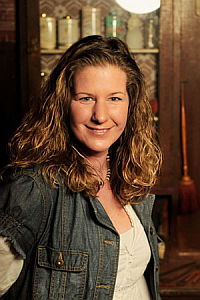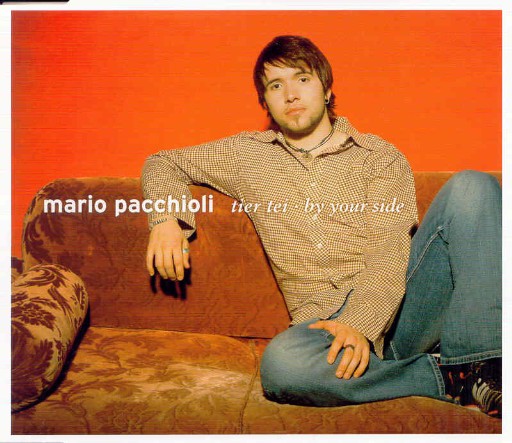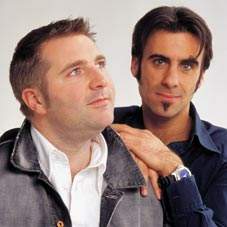
The German Final was held on March 12th at the Stadhalle in Bremen, hosted by Axel Bulthaupt and Sandra Studer (who represented Switzerland in 1991 as Sandra
Results:
01. Hör den Kindern einfach zu - Corinna May, 32% (DQ)
02. Reise nach Jerusalem - Kudüs'e Seyahat - Sürpriz, 16.2%
03. Together we're strong - Cathrin, 15.9%
04. Das tut unheimlich weh - Jeanette Biedermann, 12.2%
05. Bye bye bar - Michael von der Heide
06. Ein bißchen Sonne, ein bißchen Regen - Patrick Lindner
07. Lover boy - Carol Bee
08. Ich habe meine Tage - Megasüß
09. qHeaven - Elvin
10. Lost in love - Wind
11. Itsy Bitsy Spider - Naima
At the ESC in Jerusalem Sürpriz came 3rd with the by Ralph Siegel & Bernd Meinunger song Reise nach Jerusalem - Kudüs'e seyahat.
Sürpriz were a German-Turkish musical group, consisting of Cihan Özden, Deniz Filizmen, Yasemin Akkar, Filiz Zeyno, Savaş Uçar and Bülent Ural, known for their participation in the 1999 Eurovision Song Contest.
The group was formed by Cihan Özden in 1999 in order to enter that year's German Eurovision selection with the song Reise nach Jerusalem - Kudüs'e seyahat, which had been written by regular Eurovision composers Ralph Siegel and Bernd Meinunger.
At the German national final held in Bremen on 12 March, Reise nach Jerusalem - Kudüs'e seyahat finished in 2nd place behind Corinna May's Hör den Kindern einfach zu. However, some days later it emerged that May's song had previously been released by another singer in 1997, which contravened Eurovision rules and led to its disqualification. As runners-up, Sürpriz were therefore offered the Eurovision spot, but this too caused controversy when allegations of self-plagiarism were made, claiming that the song was remarkably similar to another Siegel composition which had appeared on a B-side in 1984, Wo geht die Reise hin? by Harmony Four. The matter was taken to the European Broadcasting Union, where a panel of experts concluded that the similarity was not sufficient to disqualify the song on the grounds alleged.
Sürpriz therefore were given the go-ahead to perform in the 44th Eurovision Song Contest, which took place in Jerusalem on May 29. On the night, the song was performed in a combination of English, German, Turkish and Hebrew and claimed an unexpected third place of the 23 entries.
The good showing at Eurovision failed to translate into substantial sales, and Reise nach Jerusalem - Kudüs'e seyahat failed to chart in Germany. The group recorded a self-titled CD, which was released in Turkey only in 2000, and continued through several personnel changes before disbanding in 2002.
Simo). The winner was chosen by televoting, with the citizens of Switzerland being allowed to participate in the televote too seeing as song 9 was from Switzerland. It was discovered on March 16th that Corinna May's song had been released on CD in 1997 by another singer, and she was disqualified. Therefore Germany was represented by the runner-up in the German Final - the group Sürpriz, who went on to come 3rd at the ESC.
Results:
01. Hör den Kindern einfach zu - Corinna May, 32% (DQ)
02. Reise nach Jerusalem - Kudüs'e Seyahat - Sürpriz, 16.2%
03. Together we're strong - Cathrin, 15.9%
04. Das tut unheimlich weh - Jeanette Biedermann, 12.2%
05. Bye bye bar - Michael von der Heide
06. Ein bißchen Sonne, ein bißchen Regen - Patrick Lindner
07. Lover boy - Carol Bee
08. Ich habe meine Tage - Megasüß
09. qHeaven - Elvin
10. Lost in love - Wind
11. Itsy Bitsy Spider - Naima
At the ESC in Jerusalem Sürpriz came 3rd with the by Ralph Siegel & Bernd Meinunger song Reise nach Jerusalem - Kudüs'e seyahat.
***
Sürpriz were a German-Turkish musical group, consisting of Cihan Özden, Deniz Filizmen, Yasemin Akkar, Filiz Zeyno, Savaş Uçar and Bülent Ural, known for their participation in the 1999 Eurovision Song Contest.
The group was formed by Cihan Özden in 1999 in order to enter that year's German Eurovision selection with the song Reise nach Jerusalem - Kudüs'e seyahat, which had been written by regular Eurovision composers Ralph Siegel and Bernd Meinunger.
At the German national final held in Bremen on 12 March, Reise nach Jerusalem - Kudüs'e seyahat finished in 2nd place behind Corinna May's Hör den Kindern einfach zu. However, some days later it emerged that May's song had previously been released by another singer in 1997, which contravened Eurovision rules and led to its disqualification. As runners-up, Sürpriz were therefore offered the Eurovision spot, but this too caused controversy when allegations of self-plagiarism were made, claiming that the song was remarkably similar to another Siegel composition which had appeared on a B-side in 1984, Wo geht die Reise hin? by Harmony Four. The matter was taken to the European Broadcasting Union, where a panel of experts concluded that the similarity was not sufficient to disqualify the song on the grounds alleged.
Sürpriz therefore were given the go-ahead to perform in the 44th Eurovision Song Contest, which took place in Jerusalem on May 29. On the night, the song was performed in a combination of English, German, Turkish and Hebrew and claimed an unexpected third place of the 23 entries.
The good showing at Eurovision failed to translate into substantial sales, and Reise nach Jerusalem - Kudüs'e seyahat failed to chart in Germany. The group recorded a self-titled CD, which was released in Turkey only in 2000, and continued through several personnel changes before disbanding in 2002.
































